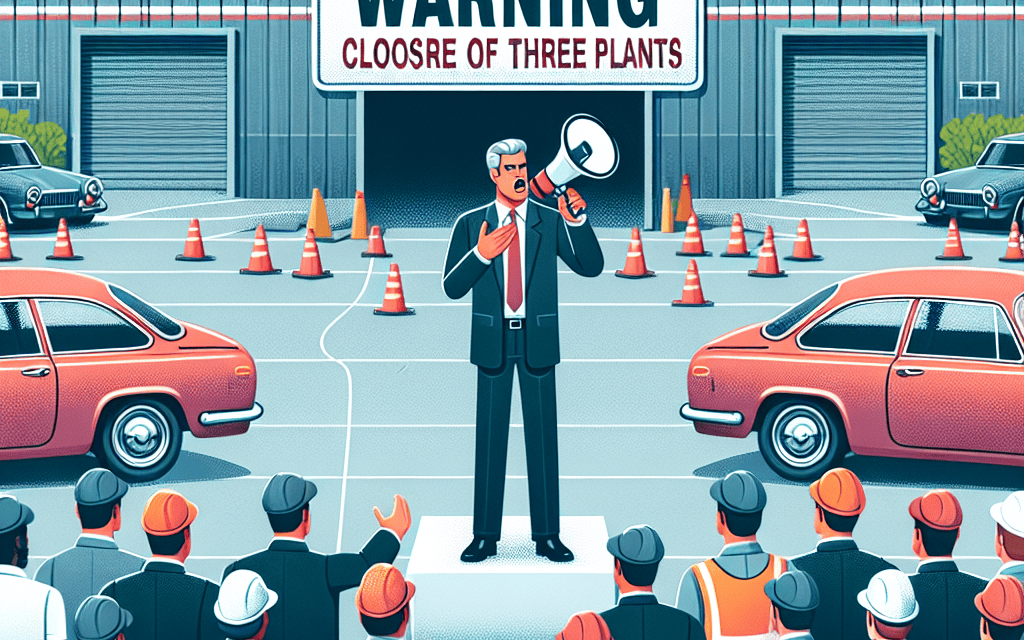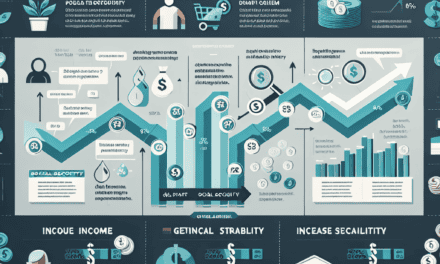“Volkswagen Faces Turbulence: Labor Chief Sounds Alarm on German Plant Closures and Job Cuts”
Introduction
Volkswagen’s labor chief has issued a stark warning about potential major layoffs and the possible closure of three manufacturing plants in Germany. This alarming announcement underscores the significant challenges facing the automotive giant as it navigates a rapidly changing industry landscape marked by the transition to electric vehicles, evolving regulatory demands, and global economic pressures. The potential job cuts and plant closures could have profound implications for the company’s workforce and the broader German economy, highlighting the urgent need for strategic adjustments and negotiations to mitigate the impact on employees and local communities.
Impact Of VW Layoffs On The German Economy
The recent warning from Volkswagen’s labor chief about potential major layoffs and the closure of three German plants has sent ripples through the German economy, raising concerns about the broader implications for the country’s industrial landscape. As one of the world’s leading automobile manufacturers, Volkswagen plays a pivotal role in Germany’s economic framework, and any significant changes within the company are bound to have far-reaching effects. The potential layoffs and plant closures underscore the challenges faced by traditional automotive manufacturers in an era increasingly dominated by electric vehicles and digital transformation.
To begin with, the automotive industry is a cornerstone of the German economy, contributing significantly to employment and GDP. Volkswagen, as a key player, employs tens of thousands of workers across its German plants. Therefore, the prospect of major layoffs is not just a company-specific issue but a national concern. The potential job losses could lead to a rise in unemployment rates, particularly in regions heavily reliant on automotive manufacturing. This, in turn, could strain local economies, reducing consumer spending and affecting small businesses that depend on the patronage of Volkswagen employees.
Moreover, the closure of three plants would have a domino effect on the supply chain. Numerous suppliers and ancillary industries are intricately linked to Volkswagen’s operations. These businesses, ranging from parts manufacturers to logistics providers, could face reduced demand, leading to further job cuts and financial instability. The ripple effect could extend beyond Germany’s borders, impacting international suppliers and partners who are part of Volkswagen’s global network.
In addition to the immediate economic impact, there are broader implications for Germany’s industrial strategy. The automotive sector is undergoing a significant transformation, driven by the shift towards electric vehicles and sustainable practices. Volkswagen’s potential restructuring highlights the urgency for traditional manufacturers to adapt to these changes. Failure to do so could result in a loss of competitive edge on the global stage, where new players and tech-driven companies are rapidly gaining ground. Consequently, the German government may need to reassess its policies and support mechanisms to facilitate this transition, ensuring that the workforce is equipped with the necessary skills for emerging technologies.
Furthermore, the social implications of such layoffs cannot be overlooked. Job security is a critical aspect of social stability, and large-scale unemployment could lead to increased social unrest and dissatisfaction. The affected workers may face challenges in finding new employment, particularly if they lack the skills required for jobs in emerging sectors. This situation underscores the importance of robust social safety nets and retraining programs to support displaced workers and help them transition into new roles.
In conclusion, the warning from Volkswagen’s labor chief serves as a stark reminder of the challenges facing the automotive industry and the broader German economy. The potential layoffs and plant closures could have significant economic, industrial, and social repercussions. As Germany navigates this period of transformation, it is crucial for stakeholders, including the government, industry leaders, and labor unions, to collaborate and develop strategies that address these challenges while fostering innovation and growth. By doing so, Germany can maintain its position as a global industrial leader and ensure a sustainable future for its workforce and economy.
Strategies For Workers Affected By VW Plant Closures
The recent announcement by Volkswagen’s labor chief regarding potential major layoffs and the closure of three German plants has sent ripples of concern through the workforce and the broader community. As the automotive industry undergoes significant transformations driven by technological advancements and shifting market demands, workers are faced with the daunting challenge of navigating an uncertain future. In light of these developments, it is crucial for affected employees to consider strategic approaches to mitigate the impact of these potential job losses and to explore new opportunities.
Firstly, workers should prioritize understanding the full scope of the situation. This involves staying informed about the company’s plans and timelines for the closures, as well as any support measures that may be offered. Volkswagen, like many large corporations, may provide severance packages, retraining programs, or assistance in job placement. Engaging with union representatives and attending company briefings can provide valuable insights and help workers make informed decisions about their next steps.
In addition to company-provided resources, affected employees should consider enhancing their skill sets to increase their employability in a rapidly evolving job market. The automotive industry is increasingly leaning towards electric vehicles and digital technologies, creating a demand for skills in these areas. Workers can take advantage of online courses, workshops, and certification programs to gain expertise in fields such as electric vehicle maintenance, software development, or data analysis. By proactively acquiring new skills, employees can position themselves as attractive candidates for emerging roles within the industry or in related sectors.
Networking is another critical strategy for workers facing potential layoffs. Building and maintaining professional connections can open doors to new job opportunities and provide support during transitional periods. Employees should consider joining industry associations, attending job fairs, and participating in online forums related to their field. Engaging with former colleagues, mentors, and industry professionals can also yield valuable advice and job leads. In today’s interconnected world, platforms like LinkedIn offer a convenient way to expand one’s professional network and showcase skills and experiences to potential employers.
Moreover, workers should explore the possibility of career counseling or coaching services. These services can offer personalized guidance on career transitions, helping individuals identify their strengths, interests, and potential new career paths. Career counselors can also assist with resume building, interview preparation, and job search strategies, providing a comprehensive approach to navigating the job market.
Financial planning is another essential aspect for workers to consider during this period of uncertainty. Evaluating personal finances, creating a budget, and exploring options for financial assistance can help individuals manage their resources effectively while seeking new employment. It may also be beneficial to consult with a financial advisor to explore options such as unemployment benefits, early retirement packages, or investment strategies to ensure financial stability during the transition.
In conclusion, while the potential closure of Volkswagen’s German plants presents significant challenges for affected workers, there are several strategies that can be employed to navigate this uncertain landscape. By staying informed, enhancing skills, networking, seeking career counseling, and planning financially, employees can better position themselves to adapt to the changing industry dynamics and seize new opportunities. As the automotive sector continues to evolve, resilience and adaptability will be key in overcoming the hurdles posed by these potential layoffs.
The Future Of Automotive Manufacturing In Germany
The automotive industry in Germany, a cornerstone of the nation’s economy, is facing unprecedented challenges as it navigates the transition to electric vehicles and the pressures of global competition. Recently, a stark warning from the labor chief of Volkswagen (VW) has brought these issues into sharp focus. The labor leader cautioned that the company might be forced to implement significant layoffs and potentially close three of its plants in Germany. This development underscores the broader challenges facing the automotive sector in the country, as it grapples with technological shifts, regulatory changes, and economic pressures.
Volkswagen, one of the world’s largest car manufacturers, has been at the forefront of the automotive industry for decades. However, the shift towards electric vehicles (EVs) has necessitated a reevaluation of its production strategies. The labor chief’s warning highlights the potential social and economic impact of this transition. The move towards EVs requires different manufacturing processes and skills, which could render some existing facilities and jobs obsolete. Consequently, the potential closure of plants and the associated job losses could have significant repercussions for the communities that rely on these facilities for employment.
Moreover, the automotive industry in Germany is not only a major employer but also a critical component of the country’s export economy. The potential downsizing of VW’s operations could have ripple effects throughout the supply chain, affecting numerous suppliers and related industries. This situation is further complicated by the global economic environment, which is characterized by supply chain disruptions, fluctuating demand, and increasing competition from international players, particularly those in Asia who are aggressively expanding their EV capabilities.
In addition to these economic factors, regulatory pressures are also playing a crucial role in shaping the future of automotive manufacturing in Germany. The European Union has set ambitious targets for reducing carbon emissions, which are driving the shift towards cleaner technologies. While these regulations are essential for addressing climate change, they also pose significant challenges for traditional automakers who must invest heavily in new technologies and infrastructure to comply. This regulatory landscape adds another layer of complexity to the decisions facing companies like Volkswagen.
Despite these challenges, there are opportunities for innovation and growth within the industry. The transition to electric vehicles presents a chance for German automakers to lead in the development of new technologies and sustainable practices. By investing in research and development, companies can create cutting-edge products that meet the demands of a changing market. Furthermore, collaboration between industry, government, and educational institutions can help to retrain workers and develop the skills needed for the future of automotive manufacturing.
In conclusion, the warning from VW’s labor chief serves as a stark reminder of the challenges facing the automotive industry in Germany. The potential for major layoffs and plant closures highlights the need for strategic planning and investment to navigate the transition to electric vehicles. While the road ahead is fraught with difficulties, there are also opportunities for innovation and leadership. By embracing change and fostering collaboration, the German automotive industry can continue to thrive in a rapidly evolving global market.
VW’s Response To Global Economic Challenges

Volkswagen, a cornerstone of the global automotive industry, is currently navigating a complex landscape of economic challenges that have prompted serious considerations about its operational future in Germany. The company’s labor chief has recently issued a stark warning about the potential for significant layoffs and the closure of three major plants in the country. This development underscores the broader economic pressures facing the automotive sector, as well as the specific challenges confronting Volkswagen as it seeks to maintain its competitive edge in an increasingly volatile market.
The warning from Volkswagen’s labor chief is not an isolated incident but rather a reflection of the broader economic headwinds that have been gathering momentum over recent years. The automotive industry, a vital component of Germany’s economic engine, is grappling with a confluence of factors that are reshaping its landscape. Among these are the ongoing transition to electric vehicles, the impact of global supply chain disruptions, and the economic uncertainties exacerbated by geopolitical tensions. These elements have collectively created a challenging environment for traditional automakers, compelling them to reassess their strategies and operational frameworks.
In response to these challenges, Volkswagen has been actively pursuing a transformation strategy aimed at securing its long-term viability. Central to this strategy is the company’s commitment to electrification, which involves significant investments in electric vehicle technology and infrastructure. However, this transition is not without its hurdles. The shift from internal combustion engines to electric powertrains requires substantial capital investment, retooling of manufacturing facilities, and retraining of the workforce. These demands place additional financial strain on the company, which is already contending with reduced profit margins and increased competition from both established and emerging players in the electric vehicle market.
Moreover, the global supply chain disruptions, exacerbated by the COVID-19 pandemic and geopolitical tensions, have further complicated Volkswagen’s operational landscape. The semiconductor shortage, in particular, has had a pronounced impact on the automotive industry, leading to production delays and increased costs. Volkswagen, like many of its peers, has been forced to adapt to these disruptions by adjusting production schedules and prioritizing certain models over others. These adjustments, while necessary, have contributed to a sense of uncertainty within the company and among its workforce.
The potential closure of three German plants and the associated layoffs represent a significant shift in Volkswagen’s operational strategy. While these measures are seen as a last resort, they highlight the difficult decisions that the company must make to remain competitive in a rapidly changing market. The labor chief’s warning serves as a reminder of the human impact of these economic challenges, as thousands of workers face the prospect of job loss and communities brace for the potential economic fallout.
In conclusion, Volkswagen’s response to global economic challenges is emblematic of the broader struggles facing the automotive industry. As the company navigates this turbulent period, it must balance the need for innovation and transformation with the imperative to support its workforce and maintain its operational presence in Germany. The path forward will require careful consideration of both short-term pressures and long-term strategic goals, as Volkswagen seeks to emerge from this period of uncertainty as a stronger and more resilient entity.
Labor Unions’ Role In Protecting VW Employees
In recent developments, the labor chief of Volkswagen (VW) has issued a stark warning regarding potential major layoffs and the closure of three German plants. This announcement has sent ripples through the automotive industry and has brought the role of labor unions into sharp focus. Labor unions have long been pivotal in advocating for workers’ rights and ensuring job security, and their involvement in this situation is no exception. As VW faces significant challenges, the unions are poised to play a crucial role in negotiating terms that could mitigate the impact on employees.
The automotive industry is undergoing a transformative phase, driven by the shift towards electric vehicles and the increasing emphasis on sustainability. This transition, while necessary, has placed traditional automakers like VW under immense pressure to adapt swiftly. Consequently, the company is grappling with the need to restructure its operations to remain competitive. However, such restructuring often comes with the risk of job losses, a concern that has been echoed by the labor chief’s recent warning.
In this context, labor unions are stepping up to protect the interests of VW employees. Historically, unions have been instrumental in negotiating fair wages, ensuring safe working conditions, and securing benefits for workers. In the face of potential layoffs, their role becomes even more critical. Unions are likely to engage in discussions with VW management to explore alternatives to job cuts, such as retraining programs or redeployment opportunities within the company. By doing so, they aim to preserve as many jobs as possible while facilitating the company’s transition to new technologies.
Moreover, labor unions are expected to advocate for transparency and open communication between VW management and employees. In times of uncertainty, clear communication is essential to maintain trust and morale among the workforce. Unions can serve as a bridge, conveying employees’ concerns to management and ensuring that any decisions made are in the best interest of both the company and its workers. This collaborative approach can help in finding solutions that balance the need for operational efficiency with the welfare of employees.
Furthermore, the potential closure of three German plants underscores the broader economic implications of VW’s restructuring plans. These plants are not only vital to VW’s production capabilities but also to the local economies they support. The loss of jobs in these regions could have a ripple effect, impacting suppliers, service providers, and other businesses that rely on the automotive industry. Labor unions, therefore, have a vested interest in advocating for measures that minimize these economic repercussions.
In addition to negotiating with VW, labor unions may also seek support from government bodies to address the challenges posed by the transition to electric vehicles. This could involve lobbying for policies that promote job creation in emerging sectors or securing funding for retraining initiatives. By collaborating with various stakeholders, unions can help create a more resilient workforce that is better equipped to navigate the evolving landscape of the automotive industry.
In conclusion, the warning of major layoffs and plant closures at VW highlights the critical role of labor unions in safeguarding employees’ interests. As the company navigates the complexities of industry transformation, unions are poised to advocate for fair treatment, job security, and economic stability. Through negotiation, communication, and collaboration, they aim to ensure that the transition is as smooth as possible for VW employees and the communities they support.
Alternatives To Plant Closures For VW
In light of the recent warning from Volkswagen’s labor chief about potential major layoffs and the closure of three German plants, it is imperative to explore viable alternatives that could mitigate such drastic measures. The automotive industry, particularly in Germany, is undergoing a significant transformation driven by the shift towards electric vehicles, digitalization, and sustainability. These changes, while necessary for long-term growth and environmental responsibility, pose immediate challenges to traditional manufacturing processes and employment structures. Therefore, identifying strategies that balance innovation with job preservation is crucial.
One potential alternative to plant closures is the re-skilling and up-skilling of the existing workforce. As the industry pivots towards electric mobility, there is a growing demand for new skills related to battery technology, software development, and electric drivetrain systems. By investing in comprehensive training programs, Volkswagen can equip its employees with the necessary skills to transition into these emerging roles. This approach not only preserves jobs but also enhances the company’s competitive edge in the rapidly evolving automotive landscape.
Moreover, Volkswagen could consider repurposing its existing facilities to accommodate the production of electric vehicles and their components. Instead of shutting down plants, the company could retrofit them to support the new manufacturing processes required for electric cars. This strategy would involve significant investment in new machinery and technology but could ultimately prove more cost-effective than building entirely new facilities. Additionally, maintaining operations at these plants would help sustain local economies and communities that rely heavily on Volkswagen’s presence.
Another viable option is to explore strategic partnerships and collaborations with other companies, including those outside the traditional automotive sector. By forming alliances with technology firms, Volkswagen can leverage external expertise and resources to accelerate its transition to electric mobility. Such partnerships could facilitate knowledge exchange, reduce research and development costs, and open up new business opportunities. Furthermore, collaborating with other automakers on shared platforms and components could lead to economies of scale, making the production of electric vehicles more economically viable.
Volkswagen could also focus on diversifying its product portfolio to include more sustainable and innovative offerings. By expanding into areas such as autonomous vehicles, mobility services, and renewable energy solutions, the company can create new revenue streams and reduce its reliance on traditional car sales. This diversification would not only align with global sustainability goals but also provide new employment opportunities within the company, potentially offsetting job losses in other areas.
In addition to these strategies, engaging in open dialogue with labor unions and government bodies is essential. By working collaboratively with these stakeholders, Volkswagen can develop comprehensive plans that address both economic and social concerns. Government support, in the form of subsidies or incentives, could play a pivotal role in facilitating the transition to electric mobility while minimizing the impact on employment.
In conclusion, while the warning of potential layoffs and plant closures at Volkswagen is concerning, there are several alternatives that the company can pursue to navigate this challenging period. By focusing on workforce development, facility repurposing, strategic partnerships, product diversification, and stakeholder collaboration, Volkswagen can not only safeguard jobs but also position itself as a leader in the future of mobility. These strategies, if implemented effectively, could serve as a blueprint for other automakers facing similar challenges in the transition to a more sustainable and technologically advanced industry.
Historical Context Of Major Layoffs In The Auto Industry
The automotive industry has long been a cornerstone of economic development and technological innovation, yet it is no stranger to the cyclical nature of economic fluctuations and the pressures of global competition. The recent warning from Volkswagen’s labor chief about potential major layoffs and the closure of three German plants is a stark reminder of the challenges that have historically plagued the auto industry. This development is not an isolated incident but rather part of a broader historical context that has seen similar occurrences over the decades.
To understand the gravity of Volkswagen’s situation, it is essential to look back at the history of major layoffs in the auto industry. The industry has experienced several significant downturns, each marked by substantial job losses and plant closures. For instance, the oil crisis of the 1970s led to a dramatic shift in consumer preferences towards more fuel-efficient vehicles, forcing many automakers to restructure their operations. This period saw numerous layoffs as companies struggled to adapt to the changing market dynamics.
Similarly, the early 1980s witnessed another wave of layoffs, driven by a global recession and increased competition from Japanese automakers. The introduction of lean manufacturing techniques by companies like Toyota set new standards for efficiency and quality, compelling traditional automakers to reevaluate their production processes. This era underscored the need for innovation and adaptability, as those who failed to keep pace with industry advancements faced significant financial difficulties.
Transitioning into the 21st century, the financial crisis of 2008-2009 marked another pivotal moment for the auto industry. The collapse of major financial institutions and the subsequent economic downturn led to a sharp decline in vehicle sales. Automakers around the world, including giants like General Motors and Chrysler, were forced to seek government bailouts to stay afloat. This period was characterized by widespread layoffs and plant closures, as companies sought to streamline operations and reduce costs in response to plummeting demand.
In light of these historical precedents, Volkswagen’s current predicament can be seen as part of a recurring pattern within the industry. The warning of potential layoffs and plant closures comes amid a rapidly changing automotive landscape, driven by the shift towards electric vehicles (EVs) and the increasing importance of sustainability. As governments worldwide implement stricter emissions regulations and consumers become more environmentally conscious, traditional automakers are under immense pressure to transition from internal combustion engines to electric powertrains.
This transition, while necessary, presents significant challenges. The production of EVs requires different manufacturing processes and skills, leading to potential redundancies in the existing workforce. Moreover, the high costs associated with developing new technologies and infrastructure for EVs place additional financial strain on automakers. Consequently, companies like Volkswagen must navigate these complexities while maintaining profitability and competitiveness.
In conclusion, the warning from Volkswagen’s labor chief serves as a poignant reminder of the historical challenges faced by the auto industry. Major layoffs and plant closures have been recurring themes, often triggered by economic downturns, shifts in consumer preferences, and technological advancements. As the industry stands on the brink of another transformative era, the lessons of the past underscore the importance of adaptability and innovation in ensuring long-term success. The road ahead may be fraught with challenges, but it also offers opportunities for those willing to embrace change and drive the future of mobility.
Q&A
1. **What is the main concern of the VW labor chief?**
The VW labor chief is concerned about potential major layoffs and the closure of three German plants.
2. **Which company is involved in the potential layoffs and plant closures?**
Volkswagen (VW) is the company involved.
3. **How many plants in Germany are at risk of closure according to the labor chief?**
Three German plants are at risk of closure.
4. **What could be the reason for these potential layoffs and closures?**
The potential layoffs and closures could be due to financial pressures, restructuring, or shifts in production strategy.
5. **Who is the labor chief issuing the warning?**
The specific name of the labor chief is not provided in the question.
6. **What impact could these layoffs have on the workforce?**
The layoffs could lead to significant job losses and economic impact on the affected communities.
7. **Is there any indication of how VW plans to address these concerns?**
The question does not provide details on VW’s plans to address these concerns.
Conclusion
The warning from VW’s labor chief about potential major layoffs and the closure of three German plants highlights significant challenges facing the automotive industry, particularly in the context of transitioning to electric vehicles and adapting to changing market demands. This situation underscores the need for strategic planning and negotiation between management and labor representatives to mitigate the impact on workers and communities. It also reflects broader industry trends where traditional automakers must balance cost-cutting measures with investments in new technologies to remain competitive. The outcome of these discussions will be crucial for VW’s future operations and its workforce stability in Germany.





